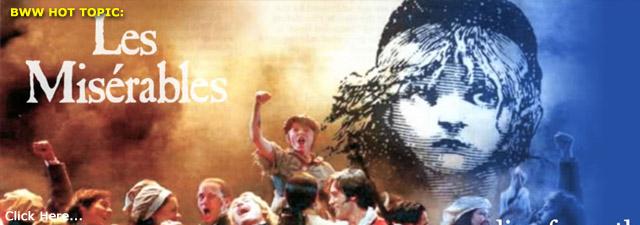Review Roundup: LES MISERABLES Opens in the Philippines
Manila, Philippines, January 17, 2013 -- "Les Miserables" fans in the Philippines had to wait a little longer for the Tom Hooper-helmed stage to screen adaptation of the famous musical, based on Victor Hugo's novel, because cineplexes, primarily in Metro Manila, were booked for the annual Metro Manila Film Festival, which showcases local movie productions, over the holidays.
However, the epic musical film, which is Golden Globe Awards' Best Motion Picture pick of the year, finally opened yesterday, January16, and reviews are out.
BroadwayWorld brings you a roundup:
Philbert Ortiz Dy, ClickTheCity.com: Much fuss has been made over the choice to have the actors sing live on set. But the more interesting choice in the movie is to have them sing in a more naturalistic way: to largely avoid theatrical technique, focusing more on the acting than the singing. This is an odd musical to try that with, because nothing about the musical is remotely naturalistic. Many of these songs are already pitched at the level of high opera, and having the actors choke through them seems counterintuitive. Still, the film sometimes hits on something exceptional. The performance bring new nuance to some of the songs, and in moments, the emotion can be astounding...
That said, this is still one of the greatest stories ever written, and the movie still manages to get the basic point across in spite of itself. Much credit must go to the cast, many of whom vividly bring these characters to life. Anne Hathaway deserves whatever plaudits she will garner over the next few months. Hugh Jackman, Amanda Seyfried and Eddie Redmayne do a fine enough job. Stage vets Samantha Barks and Aaron Tveit bring some of that experience to the screen, and it is much appreciated. Some of the other casting choices don't work out so well: Russell Crowe is unable to evoke the same level of emotion through his singing, and Sacha Baron Cohen seems to think his character is beneath him.
David Dizon, Abs-CbnNews.com: Director Tom Hooper deserves praise for shooting some of the musical's best solos ("I Dreamed a Dream," "On My Own," "Bring Him Home," "Empty Chairs and Empty Tables") in one continuous, unforgiving take without cuts -- it's like watching a theater performance up close, flaws and all...
Shorn like a sheep and forced into prostitution, Hathaway sings "I Dreamed A Dream" with both rage and despair and her performance is heady and potent. When she sings that line "Come with me, where chains will never bind you" in "Valjean's Death," it sounds like a blessing.
Mikhail Lecaros, GmaNetwork.com: "LES MISERABLES" is not a movie musical in the traditional sense, nor is it a case of a stage production awkwardly grafted onto a cinematic template. What director Tom Hooper is presenting here is cinema as stage production, in the truest possible sense. This is a stage production, plain and simple, albeit one with a multimillion dollar budget and shot unlike any musical film you've ever seen...
If there's a weak link in the cast, it would be Russell Crowe as lawman Javert. Crowe gives it his best shot, but is hampered by the fact that the hawkish nose that made him such a distinctive gladiator is also what he sings out of. Crowe cuts a striking, formidable figure in uniform, making it all the more unfortunate that his performance ends up being tear-jerking for all the wrong reasons.
Carljoe Javier, Rappler.com: Of special note is Daniel Huttlestone, who plays the instigator Gavroche. This Kid Rocks out his part, snarling in cockney and standing tall among all the other actors...
In any case, "Les Miserables" is the kind of movie that many people will love. And many people will hate.
Sometimes you feel that it's indulgent. Sometimes there's just too much of the damn singing that could have been done away with (oh and now I can imagine angry commenters saying, "You idiot, it's a musical!").
But this film adaptation is extremely effective. It employs film techniques to the service of the story of "Les Miserables," giving us a glorious version of it.
BroadwayWorld Philippines: Hooper's non-intrusive camerawork, which amounts to grandiose wide shots, especially during the sweeping melodic instrumental music played prior to or in between the sung parts, and medium close up shots, mostly one long takes filmed at least two minutes to capture the emotions of show-stopping solo numbers such as Valjean's "Soliloquy," Fantine's "I Dreamed a Dream," and Marius' "Empty Chairs at Empty Tables," aided the telling of the story, which at the core of it was the frequent exposition of Christian virtues of faith, hope, charity, mercy, and forgiveness...
On the surface, "Les Miserables" can move one to tears because of its characters' intertwined melodramatic destinies, poignant songs with ear-shattering crescendos, and bittersweet denouement.
On a deeper level, the film can also be deemed a Christian movie in disguise, which may come off as too preachy and tacky to some.
Reader Reviews
Videos


